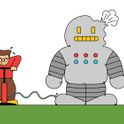How did I end up forking out £20 for an online personality test? A targeted ad for a questionnaire called the Enneagram—which gives respondents a number from one to nine—caught me at a particularly vulnerable moment one evening when I was scrolling through Instagram.
A series of chaotic nights out, poor dating choices and sertraline-induced nightmares had left me ruminating over two questions: the first, “Am I a good person?” and the second, “Why am I this way?” After checking the depleting figures in my bank account, I was scrambling to figure out why I am unable to have a simple night out without waking up the next morning down by £50 and a dozen cigarettes.
So, naturally, £20 seemed like a reasonable sum to spend on trying to figure out what the fuck is wrong with me.
For gen Zers wrestling with questions of identity, there are myriad frameworks available on the internet to help us put a label on who we are. After graduating, I felt increasingly drawn to them, as I struggled to find a sense of identity beyond academia—and the reputation I had enjoyed for the kind of debauchery that, while celebrated at university, meets with slight disapproval in the working world.
While young women are attracted to astrology, corporate men find solutions in Myers-Briggs types—a combination of four letters, each representing one end of a personality binary (eg “E” for extrovert and “I” for introvert) that may present the key to unlocking our innermost selves. Or at least the innermost self that works nine to five.
Then, of course, there’s attachment styles—a way to pathologise unhealthy relationship habits, which I stumbled upon while I was despondently swiping on TikTok. For those who aren’t familiar with attachment styles, there are online quizzes (and results sneakily hidden behind a paywall) that can reveal whether you have a “secure” approach to relationships (in which case you’re fine) or an avoidant or anxious approach (you’re a bit fucked).
The latest popular test is the one I had paid for, the Enneagram, which was first developed in the 1960s but has enjoyed a resurgence in popularity on social media. On completing it, I discovered that I am type three, “The Achiever”—which vaguely translates to “ambitious attention seeker with a crippling fear of failure and abandonment”. That checks out.
When I combine this result with my Virgo sun and Scorpio rising star sign, my ENTJ (aka “The Commander”) Myers-Briggs type and my “dismissive avoidant” attachment style, I am left with a bleak portrait of a power-hungry sociopath whose ambition and deep-seated fear of intimacy overshadow any depth and emotion.
I know this isn’t my reality; I can’t see my friends cry without shedding a few tears myself (always hidden behind a hug); my “grindset” (or grind mindset) rarely extends beyond my working hours; and I have an immeasurable capacity for lounging around in bed. I know logically that people are a culmination of the environment they grew up in, the books they’ve read (and haven’t read), their friendships and their failed relationships. But still, I succumb to the allure of compartmentalising myself into these cookie-cutter personality archetypes.
For my generation, both the real and online worlds feel increasingly chaotic, as historic markers of stability such as homeownership drift out of reach, while a ton of compulsive content drifts into view. As we spend more time online, young people are looking to social media to find a sense of belonging and community, but where millennials only had to agonise over which Hogwarts house they belonged to, gen Z has a hyper-specific mass of subtypes to choose from.
TikTok alone has birthed countless archetypes: from the productive and minimalist “clean girl” (or “vanilla girl” for 2023) to the problematically infantilised “coquette”, to the charming “frazzled English woman”—inspired by 2000s film heroines like Bridget Jones. My favourite is “goblin mode”, which won the Oxford English Dictionary’s word of the year in 2022. The word celebrates being messy and dishevelled—the antithesis of the clean girl and her pristine contemporaries.
Faced with choice paralysis amid this whirl of online personae, having a test to tell you who you are can at least give you a place to start. While there’s little these questionnaires have told me that I don’t already know, there is a joy in scanning the results with a smirk and a nod, saying, “Yeah, that’s so me.” If knowledge is power, then understanding your star sign, Enneagram type and attachment style can offer some clarity in a messy world.
But when Socrates said “Know thyself”, and Shakespeare wrote the line “This above all: to thine own self be true”, I doubt either of them were imagining that we would embark on journeys of self-discovery via online personality tests.














